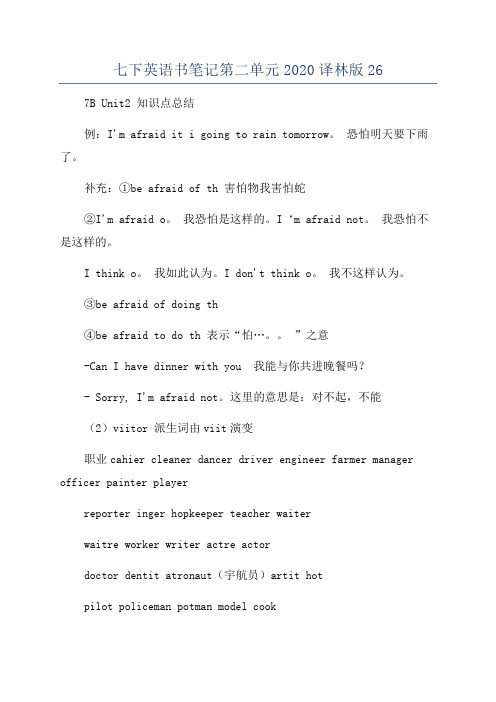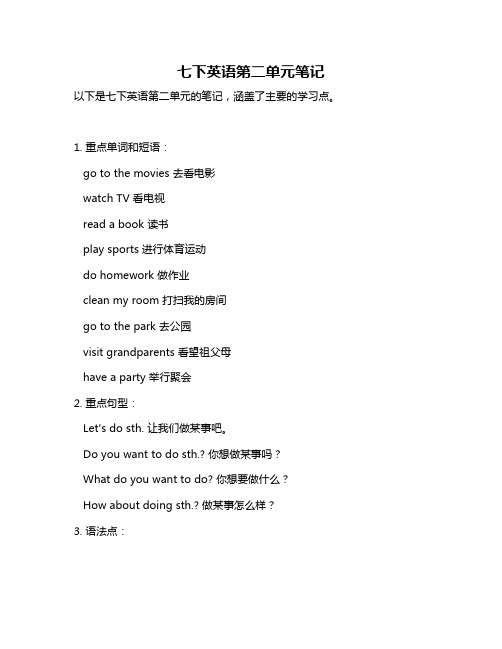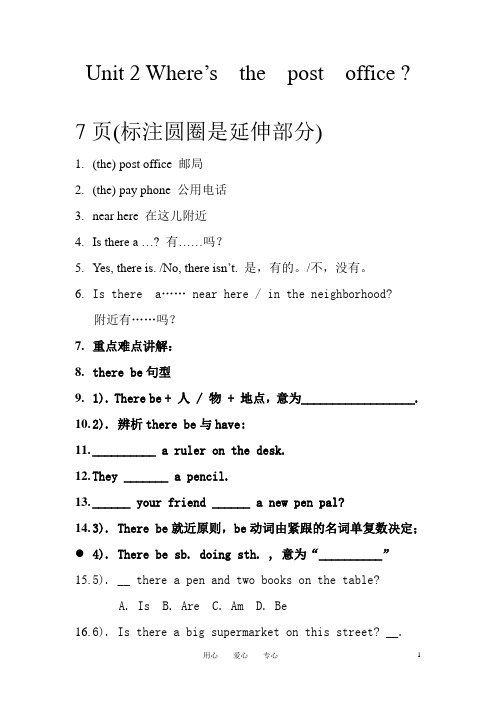初一下学期第二单元英语笔记
七下英语书笔记第二单元2020译林版26

七下英语书笔记第二单元2020译林版26 7B Unit2 知识点总结例:I'm afraid it i going to rain tomorrow。
恐怕明天要下雨了。
补充:①be afraid of th 害怕物我害怕蛇②I'm afraid o。
我恐怕是这样的。
I‘m afraid not。
我恐怕不是这样的。
I think o。
我如此认为。
I don't think o。
我不这样认为。
③be afraid of doing th④be afraid to do th 表示“怕…。
”之意-Can I have dinner with you 我能与你共进晚餐吗?- Sorry, I'm afraid not。
这里的意思是:对不起,不能(2)viitor 派生词由viit演变职业cahier cleaner dancer driver engineer farmer manager officer painter playerreporter inger hopkeeper teacher waiterwaitre worker writer actre actordoctor dentit atronaut(宇航员)artit hotpilot policeman potman model cooknure2、like介词:像look like、 be like动词:喜欢like doing th3、Mot of them have 14 floor。
大多数楼有14层。
mot的用法①表示“数量上最多,最大”,为many或much 的最高级。
例:She had the mot money of all of them。
在这些人中,她最有钱。
② mot of + the、thi、thee、that、thoe、物主代词+名词,指其中一范围内的多数。
(名词前面一定要有修饰词)③ mot of +可数名词复数+ V复mot of +不可数名词+V单④mot 与mot of 的区别1 mot+名词表泛指,无范围如:mot young peopleII mot of + 名词指其中一范围的多数III mot of +人称代词,of 不能少如:mot of them两者有时可互换:Mot teacher in thi chool are women。
七下英语unit2笔记

七下英语unit2笔记English: In Unit 2 of the seventh grade English textbook, students delve into the theme of "My School Life." The unit focuses on various aspects of school life, including school facilities, subjects, teachers, and extracurricular activities. Through reading texts, listening exercises, and speaking activities, students learn vocabulary related to school and education, as well as develop their language skills. They explore topics such as describing their school, talking about their favorite subjects, discussing school rules, and sharing their experiences of school events. Additionally, the unit provides opportunities for students to engage in group discussions, role-plays, and writing tasks to express their opinions and experiences relatedto school life. By the end of the unit, students should have a deeper understanding of school life and be able to communicate more effectively about their own experiences and preferences in school.中文翻译: 在七年级英语教科书的第二单元中,学生们探索了“我的学校生活”的主题。
七年级下册英语第二单元笔记

七年级英语下册(人教版)全册笔记超详细Unit 1 Can you play the guitar?划重点必背句型:1.let’s go, shall we ?我们一起去,好吗?2.let us go , will you ? 让我们去,好吗/3.What club do you want to join ? 你想参加什么俱乐部?4.I want to join a sports club. 我想参加体育俱乐部。
5.What do you want to do ? 你想干什么?6.I want to play basketball . 我想踢足球。
7.What can you do ? I can play the guitar .8.Can he do Chinese kung fu ?Yes, I can . / No ,I can’t .9.guitar为一种乐器,play the guitar 西洋乐器名词前要加定冠词the。
球类运动、棋类、三餐、四季不用定冠词the10.join意为“参加团体、组织(成为其成员)”join in=take part in“参加活动、比赛|”11.go swimming去游泳go+doing 去做某事12.注意区分:speak, say, talk和tell①say说话What can you say?②speak+语言③talk表示两个人或多个人在一起讲话、谈论(多指随意谈论)talk with sb与某人交谈talk to sb 向某人说… talk about 谈论…。
④tell的意思是“告诉,讲述,吩咐”,讲故事或讲笑话多用tell。
13.Show “表演,演出,出示……给某人看”,show sth. to sb.=show sb. sth.。
14.show作名词,意为“展览,展出”on show “在展出” car show 车展。
school show 学校公演fashion show 时装表演a flower show花展必背短语:1.play chess下国际象棋2.play the guitar/piano/violin/drums弹奏吉他/钢琴/拉小提琴/打鼓(play短语中,乐器名词前要加the)3.speak English/Chinese 说英语/说中文(说某种语言用speak)4.join a club 参加俱乐部join us 加入我们(join后面接社团,组织名称或人)5.music club 音乐俱乐部6.art club 美术俱乐部7.swimming club 游泳俱乐部8.want to do sth. 想要做某事(后面可以接to do sth. 的动词有:want, need, like, remember记得, learn学习, have to必须等)9.be good at sth. / doing sth. 擅长于be good with sb. 与某人相处友好be good for ….. 对…..有好处10.tell a story/ tell stories 讲故事11.like(love) to do sth./ like(love) doing sth.喜欢做某事10.school show 学校演出11.radio show 广播节目11. talk to sb. 跟某人说12. the old people's home 敬老院13. music teacher wanted 招聘音乐老师14. make friends with sb. 与某人交朋友.make sb. do sth. 让某人做某事15. call sb. at+电话号码16. help sb. with sth.= help sb. do sth. 帮助某人做17. on the weekend/ on weekends 在周末18. on weekdays 在工作日(周一到周五)19. do Chinese kung fu 表演中国功夫20. school music festival 学校音乐节21. like to do sth. =love to do sth. 喜欢/喜爱做某事22.need sb. to do sth. 需要某人做某事23.want students for the school show 需要学生参加学校表演want sb. to do sth. = would like sb. to do sth 想让某人做某事want to join the art club想参加艺术俱乐部24.join two clubs 参加两个俱乐部25.the story telling club 讲故事俱乐部26.That sounds good. 那听起来很好。
七下英语第二单元笔记

七下英语第二单元笔记以下是七下英语第二单元的笔记,涵盖了主要的学习点。
1. 重点单词和短语:go to the movies 去看电影watch TV 看电视read a book 读书play sports 进行体育运动do homework 做作业clean my room 打扫我的房间go to the park 去公园visit grandparents 看望祖父母have a party 举行聚会2. 重点句型:Let's do sth. 让我们做某事吧。
Do you want to do sth.? 你想做某事吗?What do you want to do? 你想要做什么?How about doing sth.? 做某事怎么样?3. 语法点:现在进行时态(Present Continuous Tense):表示正在进行的动作或正在发生的事情。
结构为“be动词(am/is/are)+动词的现在分词(ing形式)”。
例如:I am watching TV.(我正在看电视。
)动词的ing形式的构成:大多数动词在词尾加“-ing”,如“watching”;以不发音的字母e结尾的动词,先去掉e再加“-ing”,如“reading”;以重读闭音节结尾的动词,如果末尾只有一个辅音字母,应先双写这个字母再加“-ing”,如“running”。
4. 学习建议:结合教材中的对话和活动,多练习使用重点单词和短语,提高口语表达能力。
注意现在进行时态的用法,掌握其基本结构和变体形式,以便在实际语境中运用自如。
除了教材中的例句,可以自己尝试造句,锻炼语言组织能力。
结合个人生活实际,思考自己经常做的事情,用英语表达出来,提高实际应用能力。
新目标英语七年级下册第二单元笔记

Unit 2 Where’s the post office ?7页(标注圆圈是延伸部分)1.(the) post office 邮局2.(the) pay phone 公用电话3.near here 在这儿附近4.Is there a …? 有……吗?5.Yes, there is. /No, there isn’t. 是,有的。
/不,没有。
6.Is there a…… ne ar here / in the neighborhood?附近有……吗?7.重点难点讲解:8.there be句型9.1). There be + 人 / 物 + 地点,意为__________________.10.2). 辨析there be与have:11.__________ a ruler on the desk.12.They _______ a pencil.13.______ your friend ______ a new pen pal?14.3). There be就近原则,be动词由紧跟的名词单复数决定;4). There be sb. doing sth. , 意为“__________”15.5). __ there a pen and two books on the table?A. IsB. AreC. AmD. Be16.6). Is there a big supermarket on this street? __.17.Yes, there be. B. No, there are. C. Yes, there is. D.Yes, there isn’t.18.7). There are some people in the room. (疑) ______ there______ people in the room?19.8). There are many apples on the apple tree. _____ _____on the apple tree?20.9). There are some children ________ (play)21.6.on Center Street 在中心街22.on + 街道的名称。
七年级英语人教版下册Unit2重点知识点归纳

人教版七年级英语单元重点知识点归纳Unit2 What time do you go to school?一、重点词组与句子Section A1.what time几点,什么时候2.go to school去上学3.get up起床4.take/have a shower淋浴,洗澡5.put on穿上,增加6.go to work去上班7.get to到达8. an interesting job 一份有趣的工作9.be late for迟到10.have/eat breakfast 吃早餐11.on weekends 在周末12.get dressed = dress oneself穿上衣服13.brush teeth 刷牙14.at a radio station 在广播电台句子:1.What time is it? 几点了?2.What time do you usually get up?你通常几点起床?3.I usually get up at five o’clock. 通常5点钟起床。
4.-What time does he eat breakfast?他什么时候吃早饭?5.-He eats breakfast at seven o’clock. 他七点钟吃早饭。
Section B1.listen to听2.get back 归还,取回3.get home 到家4.get to 到达5.get for 为某人拿(取)买6.half past six 六点半7..get from 从某人/某物那得到……8.go to bed early早睡9.do (one’s) homework做作业10.go home回家11.take a walk 散步12. either…or…要么……要么……13.lots of 许多,大量14.eat dinner吃晚饭15. eat quickly吃的快16 play sports/games 做运动/游戏17. taste good尝起来不错18.healthy activities 健康的活动19. unhealthy habits 不健康的习惯句子:1.When do students usually eat dinner?学生们通常什么时候吃晚餐?2.I don’t have much time for breakfast.我没有许多时间吃早餐。
七年级下册英语第二单元课堂笔记

七年级下册英语第二单元课堂笔记全文共3篇示例,供读者参考篇1Here are classroom notes for Unit 2 in a 7th grade English textbook, written from a student's perspective in around 2000 words:Unit 2: Making a DifferenceClass Notes:This unit is all about how we can make a positive impact on the world around us, no matter how small the actions seem. Every little bit counts!Lesson 1: VolunteeringWe started by learning about volunteering and different ways to volunteer in our community. Some options discussed:• Visiting elderly residents at the nursing home and keeping them company• Picking up litter at the local park or beach• Spending time with animals at the animal shelter• Helping out at a food bank or soup kitchen• Tutoring younger students who need extra academic supportThe teacher emphasized that volunteering doesn't have to be a huge time commitment. Even an hour or two here and there can really make a difference! We talked about why volunteering is so important - it helps others, but it's also really rewarding for the volunteer. Feeling like you're giving back is awesome.For homework, we had to research a local volunteering opportunity that interested us and write a paragraph on why we'd want to help with that cause.Lesson 2: Environmental HeroesThis lesson focused on people who have made the world a greener, more sustainable place through their actions and activism. We learned about:• Greta Thunberg - The teenage environmental activist who inspired the Fridays for Future movement, demanding urgent action on climate change• Wangari Maathai - The Kenyan activist who started the Green Belt Movement focused on planting trees across Africa• Jacques Cousteau - The oceanographer who widened awareness of ocean conservation through his films and environmental activismWe watched some video clips of interviews with these environmental pioneers. They were all so passionate and inspiring! For an activity, we split into groups to research another famous environmentalist and give a short presentation on their work to the class.It really opened my eyes to how much impact one person's actions can have, even if it starts small. The challenge is to keep pushing for positive change.Lesson 3: Making Ethical ChoicesThis lesson looked at the concept of ethical consumerism - being mindful of where products come from and whether companies have ethical practices around environmental sustainability, worker treatment, etc.We discussed things like:• Fair trade certification• Cruelty-free/vegan product labeling• Sustainable/recycled materials• Carbon footprints of products• Workers' rights and factories conditionsIt was really eye-opening to learn about all the factors to consider beyond just the product itself. The teacher had us analyze a few different product labels and marketing claims to spot legitimate ethical certifications versus "greenwashing" or misleading claims.For homework, we had to bring in a product example and research whether the company seems to have ethical manufacturing and business practices based on certain criteria we learned.Lesson 4: Community Project BrainstormThe final lesson of the unit involved brainstorming a community project or service activity that our class could organize and execute to make a positive impact locally.Some ideas that were suggested:• Organizing a park/beach cleanup day• Visiting a nu rsing home and spending time with residents• Collecting donations for a food bank or animal shelter• Putting together hygiene kits for the homeless• Planting a community gardenWe had a long discussion weighing the pros and cons of each idea in terms of logistics, impact, cost, etc. In the end, we decided to pursue creating hygiene kits with personal care items to donate to a local shelter.Everyone was assigned certain tasks to prepare over the next few weeks - research what items are most needed, contact shelters about donations, make checklists and assign roles, etc. I'm really excited to put our plan into action as a class!Overall, this unit made me much more conscious about ways I can personally make a difference through small actions and choices. It showed me how fortunate I am and inspired me to look for more opportunities to be an "Environmental Hero" myself. Even kids can change the world!篇2Here are some classroom notes for Unit 2 of the 7th grade English textbook, written from a student's perspective (around 2000 words):Unit 2: Making a DifferenceClass NotesHey, it's me again with notes from our English class. We just started a new unit all about making a difference and helping others. Definitely an important topic if you ask me!2.1 Volunteer WorkFirst up, we learned about different kinds of volunteer work people can do. The teacher gave some examples like:• Working at a food bank or soup kitchen to help feed the hungry• Volunteering at an animal shelter to care for homeless pets• Joining a beach/park clean-up to keep nature beautiful• Tutoring or mentoring younger kids who need academic help• Visiting seniors at a nursing home to keep them companyShe said volunteering is great because it allows you to give back and support good causes. Plus, it looks awesome on college applications! The class discussed why people volunteer - some said to help others, make the world better, learn new skills, or even just feel good about themselves.We had to write a short paragraph about a volunteer experience we've had or would like to try. I wrote about the time my family served Thanksgiving dinner at a homeless shelter. It was an eye-opening experience.2.2 PhilanthropistsThe next few lessons covered famous philanthropists, which are people who donate lots of money/resources to charities and causes they care about. We learned about:Andrew Carnegie - A wealthy businessman in the1800s-1900s who gave away 350 million (billions today!) to fund libraries, schools, and nonprofits.Bill & Melinda Gates - The founders of Microsoft who run a massive foundation focused on global health, education, and more. They've donated over 50 billion!Oprah Winfrey - The talk show host has given over 400 million to build schools, support communities, advance civil rights, etc. She calls it "the greatest reward."We had to research another famous philanthropist and present to the class about their life/donations. I chose Dolly Parton since she has done amazing work for literacy programs.2.3 Fundraising IdeasThis section was all about creative ways to raise money for causes and nonprofits you support. The teacher shared examples like:• Bake sales or car washes• Walkathons or fun runs• Talent shows with admission fees• Selling custom t-shirts/merchandise• Crowdfunding campaigns onlineOur assignment was to get into small groups and plan a theoretical fundraising event. My group did a neighborhood dog wash, with different pricing for small/medium/large dogs. We had to consider costs, profit potential, advertising strategies, and more. Presenting our ideas helped build public speaking skills.2.4 Persuasive WritingThe last part focused on persuasive writing techniques to convince others to support a cause. We looked at examples using:• Personal stories/anecdotes to relate on an emotional level• Shocking facts/statistics to highlight the importance• Rhetorical questions to get the reader t hinking• Strong word choices like "crucial," "fundamental," etc.• Clear calls-to-action saying what support is neededThen we had to write our own persuasive letters or essays promoting a cause or social issue we care about. I chose writing about the need for better recycling/environmental protection initiatives.Overall, it was an engaging unit that opened my eyes to all the different ways people can create positive change in their communities and the world. It motivated me to start looking for more volunteer opportunities myself. Maybe I'll organize a fundraiser soon!Let me know if you need any clarification or have additional questions on this unit. I tried to cover the key lessons and activities we did in detail. Just let me know!篇3Here are classroom notes for Unit 2 of the 7th grade English textbook, written from a student's perspective in English (around 2000 words):Unit 2: Making a DifferenceClass 1: Welcome to a new unit all about making a positive impact! Today we learned some cool vocabulary related to helping others and the environment.New words:Volunteer - to offer to do something without getting paidFundraiser - an event to raise money for a causeRecycle - to process used materials to make new productsDonation - something given to a charity or good causeCommunity service - unpaid work to help your local areaThe teacher said these words will be really useful for the readings and activities coming up. We practiced using them in sentences. For example, "My family did community service by volunteering at a fundraiser to collect donations for the local animal shelter." Using new vocab in context helps cement it in my brain!Class 2: Our reading today was pretty inspiring. It was a biography about Malala Yousafzai, the Pakistani girl who survived being shot by the Taliban for advocating for girls' education. Despite the hardships she faced, Malala kept fightingto make sure all kids could go to school. She ended up winning the Nobel Peace Prize at age 17 for her courage and activism!After reading, we discussed how one determined person really can change the world. The teacher asked us to think about people in our own lives who have made a positive difference, like volunteers at a hospital or food bank. I realized my aunt who organizes neighborhood clean-ups every spring is my personal inspiration for helping the environment.Class 3: Grammar day! We reviewed the present perfect tense, which describes experiences up to the present time. Some examples:I have volunteered at the animal shelter for 2 years.She has raised 500 for charity so far.They have not recycled their plastic bottles yet.The present perfect is formed with "have/has" plus the past participle of the verb. There are some tricky irregular verbs we need to watch out for, like "done" instead of "doed." Ugh, English is weird sometimes!We also went over using "for" and "since" to specify a time period with the present perfect:For 2 years (period)Since 2020 (start time)Knowing when to use "for" vs "since" can be confusing at first. More practice will help it stick!Class 4: Our big writing assignment for this unit is a letter to someone who inspires us to make a difference. The teacher provided some guiding questions to help organize our thoughts, like:What cool things has this person achieved?How have their actions created positive change?What challenges did they face and how did they overcome them?How has this person inspired you specifically?I've decided to write about my aunt and all her hard work cleaning up litter in local parks. First I'll introduce who she is and why she started this volunteer work. Then I can describe some key accomplishments, like getting recycling bins installed at every park entrance. Despite facing opposition from people who didn't care, she never gave up. That perseverance really motivates me to find ways to help the environment too.Writing this letter will be great practice using the present perfect to discuss what she's achieved over time. It's also a chance to persuade the reader why she deserves recognition through descriptive examples and anecdotes. Can't wait to start drafting!Class 5: Our unit wrapped up with some fascinating guest speakers who visited the class—two high school students running an incredibly successful fundraiser called Toys4Tots.Chloe and Marcus shared how they started the annual toy drive just 3 years ago when they were in 7th grade. At first, they just wanted to collect a few toys to donate somewhere. But through hard work and creative promotions on social media, their little project exploded! Last year they gathered over 5,000 toys for underprivileged kids.Hearing them speak was so motivating. If two regular teenagers can create that big of an impact through sheer determination, imagine what we could all do to make the world better! Their top tips were:Start small with an achievable goalGet friends/family involved to share the workloadUse online platforms to spread awarenessNever give up when you face setbacksThey had me super inspired to look into volunteer opportunities over the summer. Even just an hour or two of my time could make a meaningful difference for someone in need. What an empowering way to wrap up this unit!。
新目标七年级下第二单元学生笔记(1)

Unit 2笔记SectionA 1a---1c1. post 邮件2. office 办公室3. library 图书馆4. restaurant 餐馆、饭店5. supermarket 超级市场6. bank 银行7. pay 付钱8. park 公园9. street 街道10. center 中心11. near 在…附近12. bridge 桥13. across 横过14. between 在…之间15. behind 在…后面16. clean 干净的17. quiet 安静的18. dirty 脏的19. hungry 饥饿的20. enjoy 欣赏21. walk 步行22. through 穿过23. beginning 开始24. tour 旅行25. visit 参观26. arrive 到达27. take 乘坐28. airport 飞机场29. pass 通过30. hope 希望重点词组:1. post office 邮局2. pay phone 投币式公用电话3.near here 在这儿附近4. on the street 在这条街5.on Center Street 在中心街重点句型:.1.Is there a bank near here? 附近有银行吗?-Yes, there is . It is on the Center Street. 是的,有,在中央大街上。
2.Is there a restaurant on Fifth Avenue?-Yes,there isn’t.3.Is there a post office near here?-Um,yes,there is.There’s one on Bridge Street."There be" 结构用法:基本结构:there be + 名词(主语)+地点/介词短语Be与其后的主语(名词)保持一致,多个主语并列时, be随第一主语变;即主语是不可数名词或单数可数名词时用is,复数时用are。
- 1、下载文档前请自行甄别文档内容的完整性,平台不提供额外的编辑、内容补充、找答案等附加服务。
- 2、"仅部分预览"的文档,不可在线预览部分如存在完整性等问题,可反馈申请退款(可完整预览的文档不适用该条件!)。
- 3、如文档侵犯您的权益,请联系客服反馈,我们会尽快为您处理(人工客服工作时间:9:00-18:30)。
初一下学期第二单元英语笔记
◆短语归纳
1. what time 几点
2. go to school 去上学
3. get up 起床
4. take a shower 洗淋浴
5. brush teeth 刷牙
6. get to 到达
7. do homework 做家庭作业8. go to work 去上班9. go home 回家
10. eat breakfast 吃早饭11. get dressed 穿上衣服12. get home 到家
13. eithe r…or… 要么…要么… 14. go to bed 上床睡觉
15. in the morning/ afternoon/ evening 在上午/下午/晚上
16. take a walk 散步17. lots of=a lot of 许多,大量18. radio station 广播电台
19. at night 在晚上20. be late for=arrive late for 迟到
◆用法集萃
1. at + 具体时间点在几点(几分)
2. eat breakfast/ lunch/dinner 吃早饭/午饭/晚饭
3. thirty\half past +基数词……点半
4. fifteen\a quarter to +基数词差一刻到……点
5. take a/an +名词从事……活动
6. from …to … 从……到……
7. need to do sth 需要做某事
◆典句必背
1. What time do you usually get up? I usually get up at six thirty.
2. That’s a funny time for breakfast.
3. When do students usually eat dinner? They usually eat dinner at a quarter to seven in the evening.
4. In the evening, I either watch TV or play computer games.
5. At twelve, she eats lots of fruit and vegetables for lunch..
6. S he knows it’s not good for her, but it tastes good.
7. Here are your clothes.
◆话题写作
主题:谈论日常作息习惯
My School Day
I am a student. I usually get up at seven, and I eat breakfast at seven thirty. Then I go to school at eight. School starts at eight thirty. I eat lunch at twelve. I go home at 17:00. I often eat dinner at 19:00 and then play the piano. I do my homework at 20:00. At 22:00, I go to bed.。
